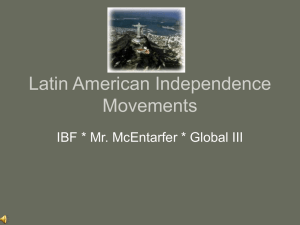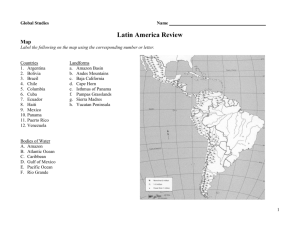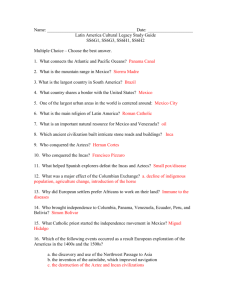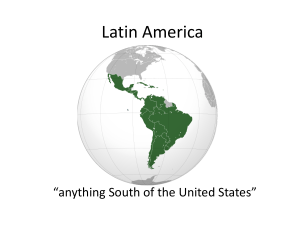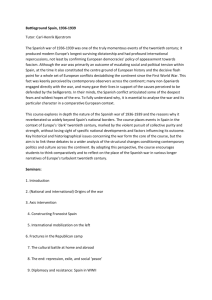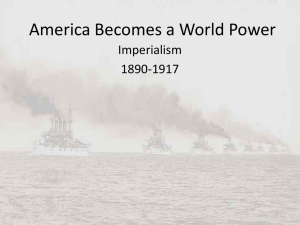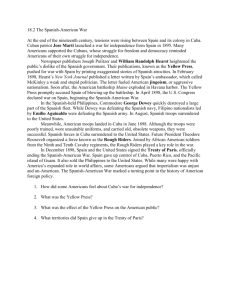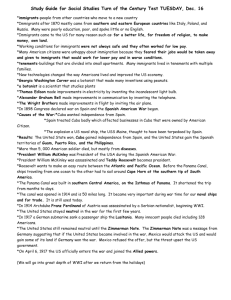History of Latin America
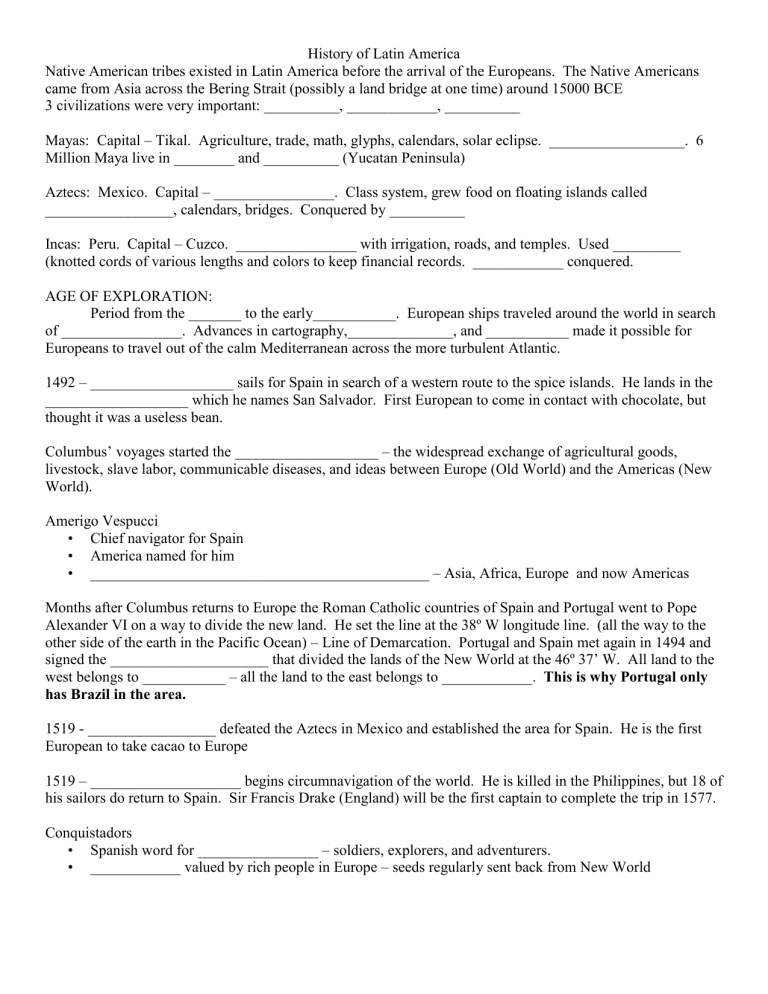
History of Latin America
Native American tribes existed in Latin America before the arrival of the Europeans. The Native Americans came from Asia across the Bering Strait (possibly a land bridge at one time) around 15000 BCE
3 civilizations were very important: __________, ____________, __________
Mayas: Capital – Tikal. Agriculture, trade, math, glyphs, calendars, solar eclipse. __________________. 6
Million Maya live in ________ and __________ (Yucatan Peninsula)
Aztecs: Mexico. Capital – ________________. Class system, grew food on floating islands called
_________________, calendars, bridges. Conquered by __________
Incas: Peru. Capital – Cuzco. ________________ with irrigation, roads, and temples. Used _________
(knotted cords of various lengths and colors to keep financial records. ____________ conquered.
AGE OF EXPLORATION:
Period from the _______ to the early___________. European ships traveled around the world in search of ________________. Advances in cartography,______________, and ___________ made it possible for
Europeans to travel out of the calm Mediterranean across the more turbulent Atlantic.
1492 – ___________________ sails for Spain in search of a western route to the spice islands. He lands in the
___________________ which he names San Salvador. First European to come in contact with chocolate, but thought it was a useless bean.
Columbus’ voyages started the ___________________ – the widespread exchange of agricultural goods, livestock, slave labor, communicable diseases, and ideas between Europe (Old World) and the Americas (New
World).
Amerigo Vespucci
•
Chief navigator for Spain
• America named for him
•
_____________________________________________ – Asia, Africa, Europe and now Americas
Months after Columbus returns to Europe the Roman Catholic countries of Spain and Portugal went to Pope
Alexander VI on a way to divide the new land. He set the line at the 38º W longitude line. (all the way to the other side of the earth in the Pacific Ocean) – Line of Demarcation. Portugal and Spain met again in 1494 and signed the _____________________ that divided the lands of the New World at the 46º 37’ W. All land to the west belongs to ___________ – all the land to the east belongs to ____________. This is why Portugal only has Brazil in the area.
1519 - _________________ defeated the Aztecs in Mexico and established the area for Spain. He is the first
European to take cacao to Europe
1519 – ____________________ begins circumnavigation of the world. He is killed in the Philippines, but 18 of his sailors do return to Spain. Sir Francis Drake (England) will be the first captain to complete the trip in 1577.
Conquistadors
• Spanish word for ________________ – soldiers, explorers, and adventurers.
•
____________ valued by rich people in Europe – seeds regularly sent back from New World
Encomiendas
•
Spanish labor system during colonization.
• the crown granted a person a specified number of ____________ for whom they were to take responsibility.
•
The receiver of the grant was to protect the natives and teach them ____________ and how to be
_____________________________
•
They could exact tribute from the natives in the form of labor, gold or other products, such as in corn, wheat or chickens. Basically ______________
Before the French and British even began to settle North America – The Spanish had set up Spanish society in
Latin America.
______________________ – Spaniards born in Europe
_____________ – Spaniards born in the New World
__________ – Spanish and Native American mix
_____________ – Spanish and African mix
_____________ – Native Americans
____________ – African slaves
Viceroys
•
___________________________, colony, or province (or state) in the name of and as representative of the Monarch.
• Latin America was split into the Viceroyalties of La Plata, New Spain, and New Granada
Late 1600 – 1700’s – Triangle Trade – sugar, rum, and slaves were the main commodities. Slaves were needed to work on sugar, tobacco, and cacao plants. haciendas
• ___________________ owned by the wealthy and worked by indigenous people (almost slaves)
•
___________________ given large land grants for conquering the area
1804 – ___________ becomes the first country in Latin America to gain independence from colonial powers
(France)
1807 – ________________ begins his revolutionary movement. Eventually, he will help in revolutions in
Venezuela, Colombia, Ecuador, Peru, Panama, and Bolivia. He is known as “El Libertador” – _____________.
He later serves as president of Greater Colombia, Peru, and Bolivia
Jose de San Martin
•
Helped ___________________ in southern South America – Chile, Peru and Argentina
Miguel Hidalgo y Costilla
•
Sept 16, 1810 he rings the bell of the church in Dolores, Mexico and proclaims an
____________________ in Mexico and calls for equality for Mexico’s various races and redistribution of land. The Cry of Dolores has great appeal to the poor.
• 9/16 is Mexico’s __________________.
Agustin de Iturbide
• General that brought about ________________ of the Mexican War of Independence
•
Named emperor of Mexico
•
The Army of the three guarantees – _______________, ___________________, and _______________ from Spain
• Abdicates, leaves, returns, executed
1810 – Mexico declares independence from Spain.
_____________________ become independent of Spain.
1811 – ________________________ become independent of Spain
Spain abolishes slavery.
Caudillos – strongmen – _____________________ ruled many Latin American countries after independence.
These men were revolutionaries that planned coup d'états. Governments were very ______________ in this region
1902 – US grants independence to _____________. US had taken control of the island in 1898 because Spain could not keep the violence under control.
1902 - US buys the __________________ from France. The US works to finish the project. ______________ is not happy with US intervention in the area.
US wanted to control the Panama Canal area, but Colombia would not agree to the US terms. The US backed the ______________________. In 1903, Panama declared ___________________ from Colombia. Panama then grants the US permission to complete the canal and control it until 1999. Opens in ________
Poverty Gap
•
__ of people lack land, adequate food, shelter, and basic education. The elite have affluence and wealth.
• In some countries up to _____ of the land and wealth belongs to only ________ of the citizens.
–
Free enterprise – everyone has the ability to make a living.
–
Democracy – outlet for protest and opposition
–
Education – the best way to improve the lives of citizens.
1910 – Mexican Revolution.
Revolutionaries such as ____________ and ______________ fought against the Presidential forces of Porfirio
Diaz. The revolutionaries wanted reforms (especially ______________). 90% of the wealth was controlled by
1% of the people.
1949 – 1989 Cold War – power struggle between the ________________, led by the USSR, and the
___________________________ led by the US. There were no actual battles in this “war”, but Vietnam,
Korea, and Cuba could be considered part of the Cold War.
1959 – _________________overthrows the government of Fulgencio Batista in Cuba. He begins collectivism and a move to __________________. Unable to get support from the US he turns to USSR.
1962 – Castro allows USSR to base __________________ in Cuba. President John F. Kennedy orders a blockade of Cuba. This situation came very close to starting __________________
Today
Latin American countries rely on ________________ – need more skilled labor, money, and natural resources.
___________________ is occurring in Latin America and US & Canada. People are moving to urban areas to find jobs.
Many Latin American industries are owned by _______________
___________________ of the rainforest is of international concern. Some US companies have begun buying parcels of land for reforestation and conservation projects.
Hugo Chavez
•
Move to the left – toward _______________. As well as Cuba – Venezuela (Chavez), Bolivia, Ecuador,
Brazil, and Paraguay have moved left and are disengaging ties with the US.
•
Chavez nationalized the _____________________.
• Media is censored
•
He would like a united Latin America with him as leader.
•
________________
Raul Castro
•
After nearly 50 years as dictator – Fidel handed over command to his brother ____________________
•
Possible move to the center and __________________ with the US
